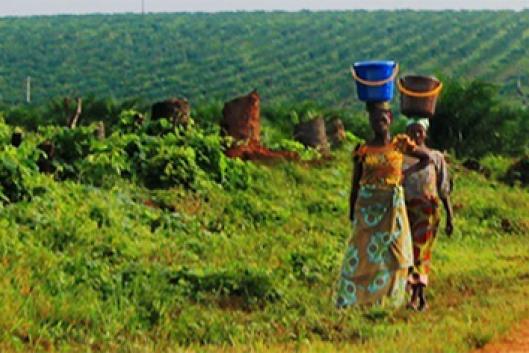Interview with Jean-François Mombia on oil palm plantations
Could you tell us what is the RIAO-RDC (Information and Support Network for national NGOs-Democratic Republic of Congo) and what are its main activities?
RIAO is an information and support network for NGOs in the Democratic Republic of Congo (DRC). It is an organization of social assistance and protection. We work hand in hand with communities to protect their rights. We also work closely with NGOs. We deal with issues that are important to the life of communities, and the protection of forest ecosystems. We also deal with micro-credits at the community level in order to help the people.
The territories along the Congo River are mainly occupied by oil palm plantations belonging to the Canadian agribusiness company Feronia Inc. Could you explain how this company has been able to take control of so many hectares of land?
Feronia inherited land that the colonizer, i.e, the agribusiness company Unilever, had previously occupied. Our ancestors, our authorities, our leaders, concerned about building good relations, gave land in exchange for peace and to stop the white men whipping our people. When Unilever came, there were already palm groves; yet there were no plantations. Mr Lever decided to negotiate. In Leverville in Lusanga where Unilever began, those natural forests had existed for a long time. The palm groves always grow along watercourses or rivers.
Since the river facilitated the transportation, they chose the land on the riverbanks. They began with small areas. They made so many false promises to our parents. The villagers feared the whip, so they gave up space for plantations. The companies also promised work and wages for the communities. Communities that wanted to approach the white, the colonizers, agreed to give land. The white promised, for example, that for every three plantations, one would be given to the community; this was never fulfilled, nor in Boteka or Lokutu, neither in Yaligimba.
Are there other companies involved?
Yes, there are companies engaged in logging around the Feronia concessions. In Igende, for example, there is a timber company. And SODEFOR, SAFBOIS, SOFORMA, SOCINEX, ISOBOIS are also present.
Were the affected communities consulted before or during the creation of plantations? If so, was the process satisfactory?
Native peoples had nothing to say in front of the colonizers. As I said, we must position ourselves in the Unilever era to understand. Unilever gave, for example, bags of salt or fabrics for those lands. And that was accompanied by promises. They deceived the people. No consultation was carried out.
Who buys palm oil produced by Feronia? And where does the demand come from (for example is it for markets within the Congo Basin, or markets located elsewhere)?
That issue is a mystery. Communities do not have access to palm oil from Feronia, although basic food is made with palm oil. The communities are deprived of that oil, it is not authorized, and people do not benefit from it. At the time of Unilever, the oil was sent to Marsavco, which produced margarine and other consumer goods. Even oil cakes were sent abroad, but now it’s not known where the oil goes. We all wonder where the oil of Feronia goes because nowadays, Marsavco imports oil from Malaysia. The ship-owner who transported the oil also disappeared a while ago. It is a real mystery.
Could you explain what are the main problems that local communities face regarding these palm oil plantations?
The first problem is malnutrition of children because, as the parents no longer have the right to go to the forest, it is difficult to practice agriculture. Today we learned that Feronia is starting to plant even in the fishponds owned by the communities. It is planting even in those areas. The communities have no hospitals, no schools, there is so much misery. Workers are treated like slaves.
Do communities face further difficulties such as health problems associated with pesticide use or water pollution?
The situation is very serious, because the villagers use factory waste to make soap. However, this waste was sprayed with chemicals that present a health danger to both the children and the youth. NPK and other products are used. Sometimes we find dead fish in rivers and fishponds. There are always problems with diarrhoea.
What activities were organized by the communities to oppose the company’s actions? What are demands of the people?
After discussions and information on the problems concerning the rights of communities, RIAO began a mobilization campaign and, after publishing the report with GRAIN, the communities who we contacted began to oppose Feronia’s return to those areas to conduct land demarcation. Communities are now constantly claiming their land; because they do not want anymore those well-known documents with conditions that the company is now trying to make them sign. Some of the affected communities have travelled more than 2,000 km to testify and meet other communities affected by Feronia’s operations.
Do you think that there have been positive reactions due to local resistance?
Yes, there were positive reactions. In Mokaria, for example, in 1997, demonstrations were able to push back the company, which then left the land. However, the State still refuses to acknowledge the restitution. But today, where Feronia is present, there are tensions, without any further positive reactions. The necessary steps are being taken to liberate the people from this company.
What kind of international solidarity do you think would be useful to support the affected communities?
The information we are providing is already making a difference. We must continue denouncing everything that happens. We demand justice, because there have been deaths and it is important to find those responsible. We must help communities, even on basic issues such as health and education. We must also help children to go to school, because one of the strategies of the company is to prevent children from doing so, so that children of workers also become workers and children of farmers also become farmers.
Jean-François Mombia, RIAO–RDC
